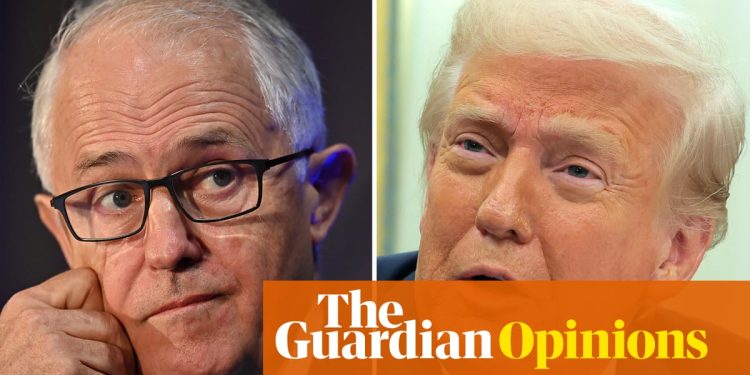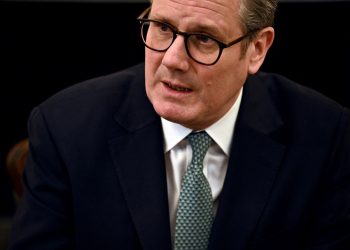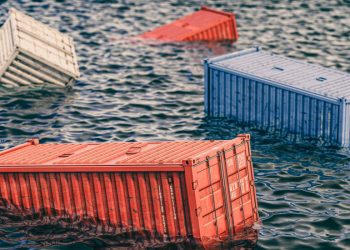Prof Hugh White, the esteemed yet critical analyst of Australian defence policy, took a deep breath, surveyed the men he had spent a lifetime debating, and said, “Donald Trump is doing us a favour.” He is proving that our old assumptions are “all wrong”.
White knew this was a provocation, but maybe one whose time had come. Malcolm Turnbull agreed that this was a debate we needed to have. As the shopping list election campaign sidesteps the changed world order, the 29th prime minister used his convening power to host a forum at the press club about the bigger underlying issues.
The room was full of men, most greyer than in their last official photographs – retired ministers, ambassadors, diplomats, generals, departmental heads, professors – a smattering of younger analysts, businessmen, politicians – and even a few women.
Most resumed their old positions, armed with memories of a time when Australia had a more independent foreign policy, put Asia first and occasionally said no to America. They recognised that, over the last decade, policies shaped in response to the 500kg Chinese panda in the room had drawn Australia closer than ever to America, a willing deputy sheriff with money, land, people and ports to share. There was widespread agreement that this needed to be recalibrated as the American eagle unlocks its talons and hovers overhead.
For years, White has been arguing that the assumptions that the United States would long be the dominant global power, lead in Asia and be guaranteed to come to Australia’s defence needed to be challenged.
Now with a man in the White House who promises to punish friends and foes who he wrongly claims have “looted, pillaged, raped and plundered” the greatest power on earth, the once unthinkable is edging towards the new normal.
Donald Trump understands that the cold war mindset is irrelevant, White said. The new world order will be very different. America will make decisions based on a narrow assessment of self-interest, as the tariffs announced on “Liberation Day” demonstrate. Or as a former Trump staffer once quipped, “Globalism means to sacrifice the nation to save the empire. ‘America first’ means to sacrifice the empire to save the nation.”
Security analyst Dr Heather Smith took it a step further and coolly declared, “The fragmentation of the international economic system is now a fact. The post-cold war order isn’t collapsing, it has collapsed. The US is dismantling the foundations of its global hegemony, along with the norms and values that have underpinned the US-Australia relationship. And this dismantling cannot be reversed by a change of administration … To say that Australia is not well positioned is an understatement. It’s a dog-eat-dog world. But our political and some of our bureaucratic class are largely admiring the problem. So the biggest challenge to overcome is the inability of our political class to position Australia for this new world.”
White’s protege Sam Roggeveen, the Lowy Institute analyst and author of The Echidna Strategy, argued that recalibrating the relationship needed to be done “not out of spite, animus or nationalism, but because we must and can”.
But how to recalibrate a relationship that, on balance, has been productive for eighty years? Geopolitics does not lend itself to easy memes and soundbites. As even the reliably lacklustre defence minister, Richard Marles, said in 2023, “Defence capability is a key factor in sovereignty. It does not define sovereignty.”
The topic of Turnbull’s seminar was sovereignty and security, but the shortcomings of Aukus gobbled the agenda. Turnbull is fuelled by righteous outrage, but is not the only former prime minister who thinks that agreement is not in Australia’s interests. Not only because of the cost, or because a US president reserves the right not to provide the Virginia-class submarines, or because the massive upgrade of Australian defence facilities to better host the American military may create new targets, or because the defence budget is skewed by it.
after newsletter promotion
The public gets it. Confidence in American reliability is tumbling in every poll. The land of the fair go is attached to rules, rules that make the game fair, but the old rulebook is now kindling stoking an American bonfire.
Maybe we can do two things at once – walk and chew gum, as the Yanks used to say – pursue Aukus and a more independent defence and industry policy; but that seems unlikely.
As Dennis Richardson, one of the most eminent retirees in the room, said: “It depends upon … our preparedness to pursue it as a national enterprise, not as a defence project”.
Spending more on defence first demands a more expansive conversation about what sort of nation Australia wants to be; about non-negotiable values; about how the economy can be diversified and made more productive; how social supports can better protect all; about how climate change and AI will change the world; about our comparative advantages in a world very different to the one that began the century.
What does our sovereignty mean? How do we exercise and protect it? How for the first time since 1788 can we adjust to not having a great superpower as our protector?
Sometime after 9/11 we stopped debating these questions. But now, thanks to Donald Trump, they are unavoidable.
#Australian #sovereignty #question #answer #Donald #Trump #Julianne #Schultz






















